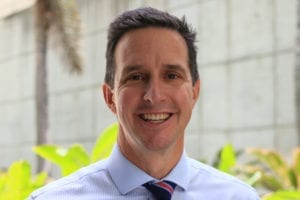International award for RBWH tele-cardiac investigation program

“One of the benefits of the program is that it can be replicated very easily, thereby enabling other countries to provide the same level of care and services,” Adj Prof Scott said.
Royal Brisbane and Women’s Hospital’s (RBWH) world-first tele-cardiac investigation program has been awarded Best Technology at the European Society of Cardiology Congress.
The event is the largest cardiac conference in the world and attracted more than 32,000 attendees to Paris this year.
Established by RBWH Director of Cardiac Sciences Adjunct Professor Adam Scott, the program has improved access to early cardiac investigations for hundreds of Queenslanders living in rural locations.
The program allows cardiac investigations to be conducted by remote control by cardiology experts from RBWH, via a video-conference platform, to support rural and regional general practitioners to perform vital cardiology tests.
Now operating in 19 hospitals across Queensland, the program has saved patients more than 202,937km of travel in the past year – equivalent to five times around the world. This means that 91 per cent of patients no longer need to travel further than their local health facility to get the cardiac tests they require.
In addition, they’ve reduced procedure waiting times from 37 days to same day access and increased Aboriginal and Torres Strait Islander testing two-fold.
Adj Prof Scott said the recognition by the European Society of Cardiology is a great reflection of the hard work the teams at each rural site have put in to provide the highest quality service provision to their patients.
“We could not have achieved this without our colleagues across Queensland who have displayed great enthusiasm and willingness to adopt new service delivery models and enable this care,” he said.
“Since piloting the program in 2016, our focus has always remained the same – to close the urban-rural disparity and provide same day access and reporting to all Queenslanders, regardless of their geographic location.
“Over the past two and a half years, we’ve worked with regional facilities to provide essential cardiology services in timeframes previously only available in metropolitan areas.”
The program has received significant interest from Sweden, Canada and China, who experience similar problems to Australia with regards to long distance and access to local diagnostic cardiac investigations.
“One of the benefits of the program is that it can be replicated very easily, thereby enabling other countries to provide the same level of care and services,” Adj Prof Scott said.
“In the future, we’d like to see programs like this replicated by other health disciplines to enable rural and remote areas of Queensland to get the support they need at the time they need it.”
